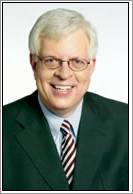“Do you love the cross because it makes much of you? Or do you love it because it enables you to enjoy an eternity of making much of God?”
Filed under: Christianity, God, John Piper, Love, Quotes, Samuel at Gilgal, The Cross of Christ | 3 Comments »
“Do you love the cross because it makes much of you? Or do you love it because it enables you to enjoy an eternity of making much of God?”
Filed under: Christianity, God, John Piper, Love, Quotes, Samuel at Gilgal, The Cross of Christ | 3 Comments »
 Radio talk show host Dennis Prager:
Radio talk show host Dennis Prager:
“I first look to the Bible for moral guidance and for wisdom. I say this even though I am not a Christian (I am a Jew, and a non-Orthodox one at that). And I say this even though I attended an Ivy League graduate school (Columbia), where I learned nothing about the Bible there except that it was irrelevant, outdated and frequently immoral. I say this because there is nothing — not any religious or secular body of work — that comes close to the Bible in forming the moral bases of Western Civilization and therefore of nearly all moral progress in the world. … If not from the Bible, from where should people get their values and morals? The university? The New York Times editorial page? … The universities and their media supporters have taught a generation of Americans the idiocy that men and women are basically the same. And they are the institutions that teach that America’s founders were essentially moral reprobates — sexist and racist rich white men.”
Filed under: Bible, Culture, Quotes, Samuel at Gilgal, Truth | Tagged: Dennis Prager | 2 Comments »
 The manner in which the Word of God is preached will certainly make the hearers aware of its importance to the preacher. Al Martin writes:
The manner in which the Word of God is preached will certainly make the hearers aware of its importance to the preacher. Al Martin writes:
I wish to apply myself very briefly to the area of the manner of the message:
URGENCY
Genuine urgency is the mother of true eloquence. A man seeking to arouse people from their sleep because of the imminent danger of fire will find little success in his mission if he simply ambles up and down the hallways of the burning dwelling mouthing with correct English pronunciation some words regarding the imminent danger. However, let a man be convinced that those lives are truly in danger, and that their deliverance hinges on his ability to stir them into immediate action, and such a man will not fail to rouse people from their sleep and cause them to take the necessary action for their safety. The urgency of such a man is not primarily born of adeptness in the arts of elocution, but it breaks forth out of the womb of genuine concern and urgency. Urgency in some, because of personality, temperament, or because of built-in microphones, may express itself in volume. In others, it may be expressed in other ways in which urgency finds her own overtones.
Urgency will cause us to labor in the area of securing and maintaining vital audience contact in the context of preaching. If we have come into the pulpit not simply to deliver an oration but to communicate urgent truth to needy men and women, we shall not rest unless we have their attention. … God alone can get the truth into the heart, but you must give yourself to gaining their ears.
Holy Spirit-wrought urgency will also drive us to work cultivating the art of communicating to men in a popular vocabulary. When we use a given word in the context of preaching and receive that ‘long ago and far away’ look, we should immediately sense that the word we have used has not registered. If we are sensitive to this, we will then use a different word. . . .
Also, this matter of urgency will drive us to work at applicatory preaching. Perhaps the most difficult part of a regular pulpit ministry is the work of application. But just as a competent physician who longs for the health of those committed to his care will not be content unless he knows the specific maladies of his people and is able to apply specific remedies, so the true servant of God … will labor to know the specific expressions of sinful need and then to apply the specific remedies set forth in the fullness of our Lord Jesus Christ. (“What is Wrong with Preaching Today?”)
Filed under: Bible, Christianity, Church Leadership, Preaching, Samuel at Gilgal, Sermon | 2 Comments »